在新西兰
Introducing Your Pet and New Baby
The Humane Society of the United States

Congratulations—you're expecting a baby! If your family already includes a pet, you'll need to help that first "baby" adjust to the new one you'll soon bring home.You can help your pet cope with this big change in much the same way parents help children understand that a new brother or sister will be joining the family. By following the tips below, you can ease your pet's stress, help her welcome your new baby, and ensure that your pet stays where she belongs—with you and your growing family.
Can I keep my cat?If you're pregnant, you've probably heard of toxoplasmosis because it can cause serious birth defects. However, toxoplasmosis is a rare disease in the United States and is one that can easily be avoided. While the disease-causing parasite can be found in the feces of cats who ingest raw meat, birds, mice, or contaminated soil, toxoplasmosis is more commonly found in uncooked or undercooked meat.
More about pregnancy and toxoplasmosis »
How will my pet react?No matter how much you plan ahead, the addition of a new family member may be difficult for your pet.
Remember, your dog or cat was your first "baby" and is used to being the center of your attention. So it's understandable that she may experience something akin to sibling rivalry when you introduce a new human baby into your household.
You can minimize this feeling by working with her before you bring home your baby. For example, because your new baby will demand a lot of your time and energy, gradually accustom your pet to spending less time with you.
Drastically decreasing attention and frequently scolding, ignoring, or isolating your pet after the baby comes home will likely make your pet feel stressed. If your pet is particularly attached to the mother-to-be, another family member should develop a closer relationship with the animal. That way, the pet can still feel loved and provided for while mom is busy with the baby.
How can I prepare my pet?Below are several suggestions to make introducing your pet and baby safer and smoother for all. Be sure to carry out these changes months before the baby's arrival to best prepare your pet.
Take your pet to the veterinarian
for a routine health exam and necessary vaccinations.
Spay or neuter your pet.
Not only do sterilized pets typically have fewer health problems associated with their reproductive systems, but they are also calmer and less likely to bite.
Consult with a veterinarian and pediatrician
if the thought of your newborn interacting with the family pet makes you uncomfortable. By working with these experts before your baby is born, you can resolve problems early and put your mind at ease.
Address any pet training and behavior problems.
If your pet exhibits fear and anxiety, now is the time to get help from an animal behavior specialist. If your pet's behavior includes gentle nibbling, pouncing, or swatting at you and others, redirect that behavior to appropriate objects.
Get your pet used to nail trims.
Train your pet to remain calmly on the floor beside you
until you invite him on your lap, which will soon cradle a newborn.
Consider enrolling in a training class
with your dog, and practice training techniques. Training allows you to safely and humanely control your dog's behavior and enhances the bond between you and your pet.
Encourage friends with infants to visit your home
to accustom your pet to babies. Supervise all pet and infant interactions.
Accustom your pet to baby-related noises
months before the baby is expected. For example, play recordings of a baby crying, turn on the mechanical infant swing, and use the rocking chair. Make these positive experiences for your pet by offering a treat or playtime.
To discourage your pet from jumping
on the baby's crib and changing table, apply double-stick tape to the furniture.
If the baby's room will be off-limits to your pet, install a sturdy barrier
such as a removable gate (available at pet or baby supply stores) or, for jumpers, even a screen door. Because these barriers still allow your pet to see and hear what's happening in the room, he'll feel less isolated from the family and more comfortable with the new baby noises.
Use a baby doll to help your pet get used to the real thing. Carry around a swaddled baby doll, take the doll in the stroller when you walk your dog, and use the doll to get your pet used to routine baby activities, such as bathing and diaper changing.
Talk to your pet about the baby, using the baby's name if you've selected one.
Sprinkle baby powder or baby oil on your skin
so your pet becomes familiar with the new smells.
Finally, plan ahead to make sure your pet gets proper care
while you're at the birthing center.
After the baby is bornWelcoming a new baby is exciting for your family. Remember when you first brought home your dog or cat? But before you bring your baby home from the hospital, have your partner or friend take home something with the baby's scent (such as a blanket) for your pet to investigate.
When you return from the hospital, your pet may be eager to greet you and receive your attention. Have someone else take the baby into another room while you give your pet a warm, but calm, welcome. Keep some treats handy so you can distract your pet.
After the initial greeting, you can bring your pet with you to sit next to the baby; reward your pet with treats for appropriate behavior. Remember, you want your pet to view associating with the baby as a positive experience. To prevent anxiety or injury, never force your pet to get near the baby, and always supervise any interaction.
Life will no doubt be hectic caring for your new baby, but try to maintain regular routines as much as possible to help your pet adjust. And be sure to spend one-on-one quality time with your pet each day—it may help relax you, too. With proper training, supervision, and adjustments, you, your new baby, and your pet should be able to live together safely and happily as one (now larger) family.




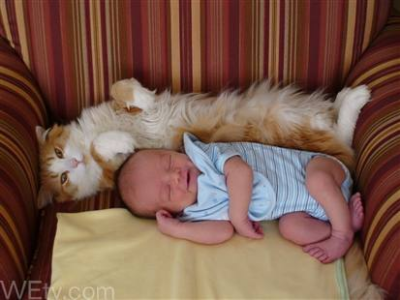
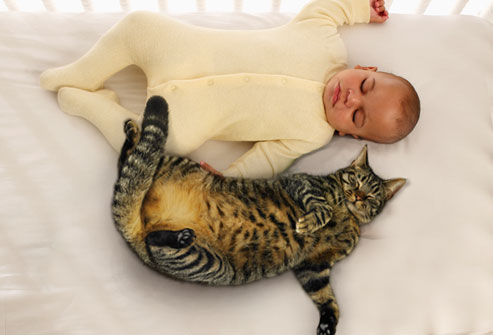









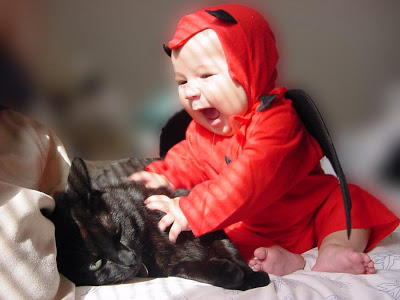
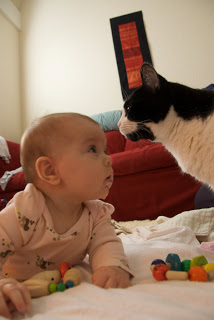
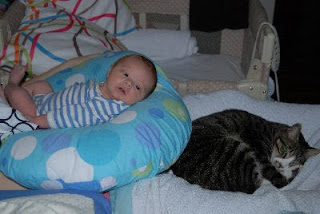
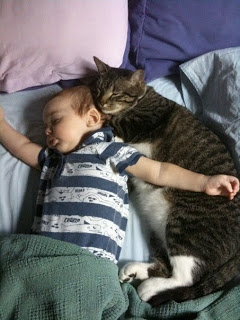




评论
好肥的猫呀.......................................................{:8_399:}
评论
好可爱的照片哈哈。。。。。
评论
洋人家长真是大气啊,也不怕猫把孩子脸或眼睛挠了造成残疾什么的
评论
好肥的猫。。。。 肥硕啊
我家也有亲密照





评论
呵呵我家也有改天发来
评论

好可爱哈
{:8_399:} {:8_399:} {:8_399:}
评论
我家老大帮我看孩子呢,我同我妈如果不在孩子旁边,他就坐那里盯着宝宝,每次宝宝哭他就会过来看看。呵呵,我家猫养的都象狗。老二就喜欢争宠,不理她,呵呵
发送自我的iPhone天维网应用。
评论
我家的猫非常羡慕我家二宝的待遇,二宝坐的high chair,睡的小床,玩的玩具,我家的猫咪都要去试试,非常爱争宠。不过见到二宝害怕,任凭她怎样的蹂躏。哈哈哈。。。
评论
其實你以為他們會很不小心弄傷孩子
相反的,自家養的動物反而會小心翼翼的
我養的貓們都無比的愛心阿~當孩子在他們身邊動作極輕阿
動都不敢動的
评论
我也來幾張




评论
好有爱啊。。。。。。。。。。。。。。。。。。。
评论
哎呀我的天,太可爱了。楼上宝宝们的照片也是{:8_399:}
评论
我家猫猫脾气大。。不知道到时候,会不会容易接受我们的小宝宝
评论

太可爱了,大小宝宝
;38; ;38;
评论
這張超有愛是吧~~~
我對我家貓都說:要讓妹妹.要疼妹妹
btw...你家娃快出來了..你家貓也不少阿
评论
超有愛
我家有一只猫
评论
現在沒寄養拉??
评论
我家宝和我家狗是互不理。。。
评论
怀孕以后,就没做了
评论
虽然是有爱!个人感觉还是要保持警惕的!不应该让狗或猫和宝宝独处。个人意见别拍我{:8_401:}
评论
獨處肯定不會的呀
大人得在身邊的..萬一有個不注意有閃失了肯就後悔莫及了
评论
太可爱啦!
也不知道我带宝宝回国,我家的大可卡能不能和女儿相处好!{:8_394:}
评论
我晚点也去找一张发过来
评论
哈哈哈,怎么都那么可爱阿~~~
评论
我家土从怀孕开始就一直规定不让进预备婴儿房。现在我在里面,他都很乖的爬外面看着,希望他能爱兔崽。